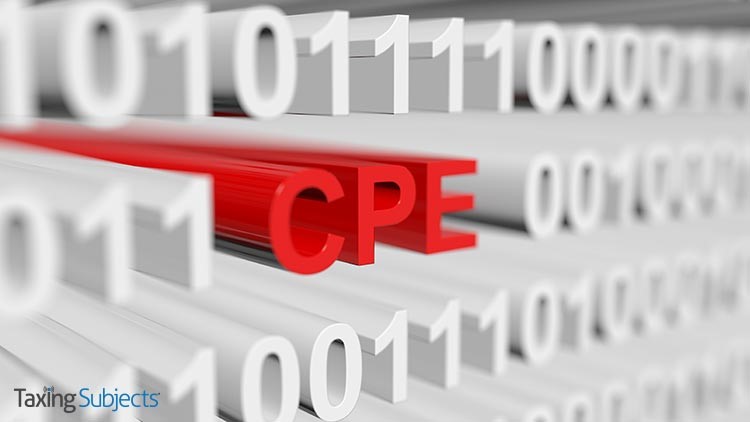by | Apr 6, 2020 | Tax Tips and News
Last Saturday, Taxing Subjects spotlighted a phishing scam that emerged after legislators passed the CARES Act, which distributes economic impact payments to help recover from financial hardships caused by COVID-19. Today, the IRS outlined common tactics used by these scammers, as well as briefly explaining the economic impact payment process.
What is the ‘coronavirus stimulus scam?’
Scammers are posing as government officials and contacting targets to request information they say is required to process coronavirus stimulus payments. Unfortunately, they are now using every tactic possible, from email and phone scams to text messages, social media, and fake websites.
As IRS Criminal Investigation Chief Don Fort points out in the press release, “History has shown that criminals take every opportunity to perpetrate a fraud on unsuspecting victims, especially when a group of people is vulnerable or in a state of need.” To avoid becoming a victim of this latest phishing scam, the agency suggests keeping an eye out for communications that use any of these common tactics:
- [Emphasizing] the words “Stimulus Check” or “Stimulus Payment.” The official term is economic impact payment.
- [Asking] the taxpayer to sign over their economic impact payment check to them.
- [Asking] by phone, email, text, or social media for verification of personal and/or banking information saying that the information is needed to receive or speed up their economic impact payment.
- [Suggesting] that they can get a tax refund or economic impact payment faster by working on the taxpayer’s behalf. This scam could be conducted by social media or even in person.
- [Mailing] the taxpayer a bogus check, perhaps in an odd amount, then [telling] the taxpayer to call a number or verify information online in order to cash it.
Remember, the IRS will not request information to process “stimulus payments” by phone, email, text, or social media. It turns out that most economic impact payments will be issued automatically.
What is the real economic impact payment process?
“In most cases, the IRS will deposit economic impact payments into the direct deposit account taxpayers previously provided on tax returns,” the IRS explains. “Those taxpayers who have previously filed but not provided direct deposit information to the IRS will be able to provide their banking information online to a newly designed secure portal on IRS.gov in mid-April.”
While the IRS generally uses recently filed tax returns to determine economic impact payment eligibility, the agency says that retirees who don’t have a filing requirement—Social Security recipients, in particular—do not have to do anything to receive their payment. (At this time, it remains unclear how the IRS will issue payments to other taxpayers who aren’t required to file.)
Just like a standard tax refund, those who don’t set up a direct deposit account will receive a physical check in the mail.
What should I do if I am targeted by the stimulus scam?
If someone calls asking for information needed to process a stimulus payment, hang up the phone; the IRS does not want you to interact with scammers. Similarly, if you get an email or message on Facebook asking for that information, do not respond, and do not click on any embedded links. Instead, the IRS wants you to report the incident to follow the directions on their Report Phishing and Online Scams webpage.
Source: IR-2020-64
– Story provided by TaxingSubjects.com
by | Apr 4, 2020 | Tax Tips and News
The coronavirus pandemic has pushed the IRS to order its workforce to work from home. The IRS issued an email announcing the shift, and Accounting Today magazine obtained a copy of the email.
“As a result of recent OPM [U.S. Office of Personnel Management] guidance, starting Monday, March 30, 2020, the IRS is directing all employees, including employees who are currently not teleworking but whose work is portable or can be adapted to work off-site, to evacuate the work site and work from home (or an alternate location)—including employees who are not currently on a telework agreement,” said the memo. “All employees affected by this directive must take their equipment home to be prepared to work from home.”
The email directed workers to a chart that shows just which employees were expected to leave the premises and gave information to managers to better answer employee questions.
The memo also makes it clear that sick employees should not come in to the office, citing concerns for their own safety—and the safety of others.
The move to evacuate is no surprise to the union that represents IRS workers. Accounting Today reports the National Treasury Employees Union previously urged all federal agencies to close buildings housing 50 or more employees.
Latest in a Series of Steps
The IRS just recently closed its Practitioner Priority Service, which services the needs of tax professionals. The IRS website also said some other operations are being curtailed during the virus onslaught, but the agency is continuing to accept tax returns and send out refunds, both activities deemed mission-critical by the IRS.
The work-at-home order may have implications for the IRS’ latest project: sending out the stimulus payments that were approved by Congress to taxpayers. Those millions of checks and direct deposits are expected to be sent out in the next few weeks. The IRS cautions, though, checks sent through the mail will take longer to process.
– Story provided by TaxingSubjects.com
by | Apr 1, 2020 | Tax Tips and News
Distribution of the federal government’s economic impact payments, meant to counter the economic effects of the coronavirus pandemic in the U.S., is scheduled to start in the coming weeks, according to the U.S. Treasury Department. No action is required on the part of most taxpayers.
However, some seniors and others who normally don’t file a return will need to submit a simple tax return to receive a stimulus payment.
There are a few things the Treasury Department and the IRS want taxpayers to know about the payments and the process to distribute them.
Who is Eligible?
Taxpayers with adjusted gross income (AGI) of up to $75,000 for individuals and $150,000 for married couples filing jointly will get the full amount. Above the stated limits, the payment is reduced by $5 for each $100 above the $75,000 or $150,000 thresholds.
Single filers with income above $99,000 and joint filers making more than $198,000 with no children are not eligible.
Eligible taxpayers who filed tax returns for 2019 or 2018 will automatically receive a payment of up to $1,200 for individuals or $2,400 for married couples. Parents will also get $500 for each qualifying child.
How Will the IRS Know Where to Send It?
The IRS says the “vast majority” of taxpayers don’t have to take any action. The IRS will automatically calculate and send the payments to eligible taxpayers.
For those who’ve already filed their 2019 tax returns, the IRS will use this most recent information to figure the payment amount. If taxpayers have not yet file their return for 2019, their 2018 tax return will be used to calculate the payment.
The economic impact payment will be deposited directly into the same banking account used on the return that was filed.
If the IRS Doesn’t Have Your Direct Deposit Information
Treasury plans to develop a web-based portal for individuals to provide their banking information to the IRS online, so that taxpayers can get payments immediately, as opposed to waiting for a check in the mail.
Not Required to File a Tax Return?
People who typically don’t file a tax return will need to file a simple return to receive an economic impact payment. Low-income taxpayers, senior citizens, Social Security recipients, some veterans and taxpayers with disabilities who are otherwise not required to file will not owe tax.
How to File the Necessary Return
The IRS will soon provide instructions on IRS.gov/coronavirus on how to file a 2019 tax return with simple—but necessary—information, including their filing status, number of dependents and direct deposit bank account information.
Didn’t File in 2018 or 2019?
You can still receive a payment. The IRS urges anyone with a tax-filing obligation who hasn’t yet filed a return for 2018 or 2019 to do so as soon as they can in order to receive a stimulus payment. Taxpayers should include direct deposit banking information on the return.
How Long are the Payments Available?
For those concerned about visiting a tax professional or otherwise getting help to file with a tax return, the economic impact payments will be available throughout the rest of 2020.
Need More Information?
The IRS will post all key information on IRS.gov/coronavirus as soon as it becomes available.
Keep in mind, the IRS has a reduced staff in many of its offices but remains committed to helping eligible taxpayers receive their payments in a quick and efficient manner. Check for updated information on IRS.gov/coronavirus instead of calling the IRS help line, where operators are trying to help taxpayers file their 2019 returns.
– Story provided by TaxingSubjects.com
by | Apr 1, 2020 | Tax Tips and News
COVID-19 could affect CPE reporting deadlines.
The National Association of State Boards of Accountancy (NASBA) on Tuesday announced that it was recommending state boards of accountancy across the country extend their CPE-completion deadlines to accommodate accountants affected by COVID-19 disruptions. This development comes on the heels of federal, state, and local governments implementing a number of public safety measures designed to reduce the spread of the coronavirus.
NASBA recommended extending current CPE deadlines to October 31, 2020. “If a CPA’s reporting period ended on March 31, 2020, the licensee would have until October 31, 2020, to complete the CPE requirements for that reporting period,” NASBA explained. “Similarly, if a CPA’s reporting period ended on June 30, 2020, the licensee would have until October 31, 2020, to complete the required CPE.”
As an advocacy and advisory group for state boards of accountancy, NASBA notes in the press release that it does not hold regulatory authority over those bodies. While individual boards of accountancy will make their own determinations concerning CPE deadlines for current and pending licensees, NASBA committed to cataloguing which states extend their CPE deadlines.
In the announcement, NASBA noted that their office—located in Nashville, TN—has already transitioned to remote work, underscoring the challenges faced by businesses across the country.
Source: “CPE Reporting Grace Period Due to COVID-19 – NASBA Recommendations”
– Story provided by TaxingSubjects.com




